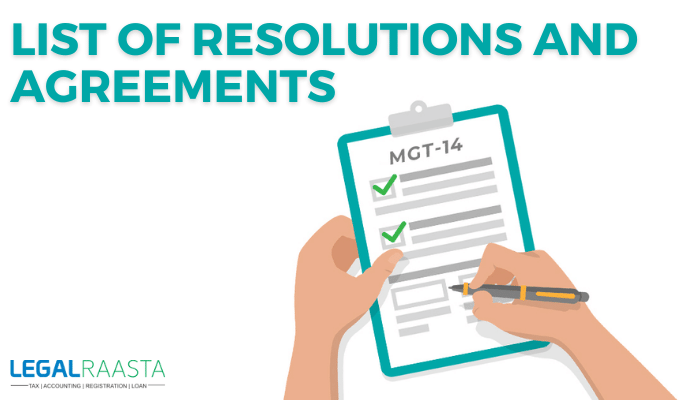MGT-14: List of Resolutions and Agreements to be Filled
Sections 94(1) and 117(1) of the Companies Act 2013 and the rules established thereunder require a company to file MGT-14 with the Registrar of Companies (RoC). Private corporations, on the other hand, are immune from filing Board Resolutions. For subjects mentioned in section 179(3) of the Firms Act 2013 read with rule 8 of the Companies (Meetings of Board and its Powers) Rules 2014, private companies are not required to file MGT-14. As a result, private businesses are exempt from filing e-form MGT-14 with the RoC on the exercise of Board powers under Section 179(3) of the Companies Act 2013.
Purpose of Filing MGT-14
Board of Directors/Shareholders/Creditors meetings are held, and resolutions are passed at those sessions. The corporation or liquidator, as the case may be, must file resolutions with the ROC, and these resolutions are filed in Form MGT-14.
Resolutions/Agreements to be Filed Under Section 117(3)
- Special Decisions.
- Resolutions that have been agreed upon by all members of the firm to be passed as special resolutions.
- Any BOD resolution relating to the appointment, reappointment, renewal, or adjustment of the managing director’s terms of appointment.
- Resolutions that have been agreed to be passed by a certain majority or in a specific way by any class of members.
- Resolutions requiring the company to be wound up in accordance with section 59 of the Insolvency and Bankruptcy Code 2016.
- Resolutions enacted pursuant to Section 179 (3).
List of Resolutions to be Filed in MGT-14
The following are the three categories of resolutions filed in MGT-14:
Annexure A – Board Resolutions
The following items addressed in board resolutions must be filed in Annexure A:
- Examining the subsidiary’s books of accounts as well as its other records.
- Permission to contribute to political campaigns.
- The corporation makes an investment or provides a loan, guarantee, or security.
- Contract/agreement with a related party.
- Appointment of a company’s full-time key management people.
- Appointment of a managing director who is also a manager or managing director of another company.
- Self-prospectus approval.
- Appointing, re-appointing, renewing or varying the terms of a managing director’s appointment.
- Requiring the shareholders to pay the unpaid sum on their shares.
- Authorization of securities buybacks, as defined by Section 68.
- Issuing securities in India and abroad (including debentures).
- To obtain financial assistance.
- The Board’s report and financial statements are approved.
- To broaden the scope of the company’s operations.
- To sanction a merger, amalgamation, or rebuilding.
- Buying a controlling position in another company or taking over a company.
Annexure B – Special Resolutions
The following items addressed in the special resolutions must be placed under Annexure B:
- Companies inserting an entrenchment provision in their articles of incorporation.
- Moving a registered office in the same state from one city to another.
- Amendments to the Memorandum of Association
- If the funds raised are not used, the object may be changed.
- Changes to the Association’s Articles of Incorporation
- Changes in a contract’s terms or in the prospectus’s objects.
- Depository receipts may be issued in any foreign country.
- Shareholder rights can be modified.
- Shares of sweat equity are available for purchase.
- Granting stock options to employees.
- Security offering that is only available to a limited number of people.
- Debenture or loan issues with a conversion option to stock.
- A decrease in the amount of money invested in the company.
- Employees gain from the purchase/subscription of fully paid stock.
- Shares repurchased
- Keeping records outside of the registered office in India.
- Termination of the auditor’s term before it ends.
- More than 15 directors will be appointed.
- Independent Director’s re-appointment.
- Limiting a director’s number of board positions.
- Selling, leasing, or otherwise disposing of the firm’s entire/substantially entire undertaking, or, if the company owns more than one undertaking, the entire or substantially entire undertaking of any of them.
- Investing in trust securities otherwise, the amount of remuneration received as a result of a merger or amalgamation.
- Borrowing money, save for temporary loans taken from the company’s bankers in the usual course of business, if the amount to be borrowed plus the amount already borrowed by the firm exceeds the sum of the company’s paid-up share capital plus free reserves.
- Allow time for the repayment of a director’s obligation.
- A plan to provide directors with a loan.
- Loans and investments totaling more than 60% of a company’s paid-up share capital, free reserves, and securities premium account, or 100% of its free reserves and securities premium account, whichever is greater.
- Appointment of a director over the age of 70, i.e. a managing director/whole-time director/manager.
- The company’s affairs should be scrutinized.
- A request to the registrar to have a name removed from the register.
- A scheme for combining ailing enterprises with other businesses.
- A court-ordered liquidation of a firm.
- The company’s voluntary dissolution
- To provide the liquidator the authority to take shares or other property as payment for a property sale.
- The agreement between the company about to be wound up and its creditors must be approved in order for it to be binding.
- Giving the company liquidator permission to execute specific authorities.
- When a company is totally wound up and about to be dissolved, the books and papers of the company are disposed of.
Annexure C – Ordinary Resolutions
The following items dealt with in ordinary resolutions must be filed under Annexure C:
- If it is discovered that the name was applied by providing false information, the company must alter its name after getting direction from the registrar.
- If the name/trademark is too similar to an existing company name/registered trademark, the company must modify its name after getting direction from the Central Government.
- Deposits from the general public are accepted.
- Representation of corporations at company meetings.
- Attendance at any creditors’ meeting.
- Appointing anyone as a statutory auditor other than a retired auditor.
- The removal of a director before the end of his term of office.
- The board’s delegation of authority as described in Section 179(3) clauses(d) to (f).
- Permission from a director of the firm/holding/subsidiary/associate company to engage in non-cash transactions.
- A managing director/whole-time director/manager is appointed.
- Dissolution following consideration of the Company Liquidator’s findings.
- The company’s voluntary dissolution is due to the expiration of its duration period or the occurrence of any event for which the articles prescribe that the company should be dissolved.
- Entering into a contract with a related party if the transaction exceeds the stipulated amount or if the company has a prescribed paid-up capital.
Penalty Under Section 117
The penalty for failing to file the Resolution or the Agreement under sub-section (1) of Section 117 before the expiration of the period specified in Section 403 with an additional cost is as follows:
| Defaulting party | Penalty |
| Company | Minimum: Rs 1 lakh In case the failure continues after the first one: Rs 500 for each day Maximum: Rs 25 lakh |
| Every defaulting officer (including the liquidator of the company) | Minimum: Rs 50,000 In case the failure continues after the first one: Rs 500 for each day Maximum: Rs 5 lakh |
Time Limit For Filing MGT-14
The corporation must file resolutions and agreements in form MGT-14 within 30 days of the resolution being passed or the agreement being entered into, as required by Section 117(1).
Consequences of Failure to File MGT-14 Within 300 Days From Passing of Resolution
The Company will not be able to file form MGT-14 in this scenario. MGT-14 requires the SRN of INC-28, and INC-28 can only be filed after getting a condonation order. The Ministry of Corporate Affairs has the authority of condonation. The following are the measures to take in order to get a delay excused:
- The corporation will be required to file Form CG-1 with the MCA in order to be excused from filing Form MGT-14.
- The MCA will impose a penalty in the condonation order, and the corporation will be responsible for paying the penalty.
- The company must file a copy of the order and the penalty receipt in form INC-28 with ROC after receiving the order and paying the penalty.
- The corporation must then submit e-form MGT-14 with the SRN of INC-28.
Disclaimer: The information contained below is offered exclusively for educational reasons. When you access or utilize the site or the materials, no attorney-client relationship is formed. This site’s content does not represent legal or professional advice, and it should not be used for that purpose or as a substitute for legal counsel from a licensed attorney in your state.
Also, read: Exemption To Private Companies
Debt Recovery Tribunal (DRT)









